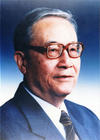

Ye Duzheng(1916- )is a native of Anqing, Anhui Province. Ye is an atmospheric physician. He graduated from Tsinghua University in 1940 and received a doctorate of University of Chicago in 1948. He was elected an academician of the Chinese Academy of Sciences in 1980. He was once research fellow and dean of Geophysics Institute of Chinese Academy of Sciences, head of Atmospheric Physics Institute, CAS and Vice President of China Academy of Sciences; now he is honorary president of Atmospheric Physics Institute of CAS, honorary member of American Meteorological Society, member of UK Royal Meteorological Society, and foreign member of Finland Academy of Sciences.
In early time of his career, Ye Duzheng engaged in the study of atmospheric circulation and long-wave dynamics. Following C.G. Rossby, he proposed the energy dispersion theory of long-waves, which was a considerable contribution for the study of momentum meteorology. During the 1950s, he proposed that the Qinghai-Tibet Plateau is the heat source in summer, thus opening up the study on the terrestrial heat effect. In 1958, Ye and Tao Shiyan put forward the idea that the seasonal discontinuity of atmospheric circulation in the Northern Hemisphere and introduced a series studies for this idea. In the 1960s, Ye made contributions to the applicability theory of atmospheric wind field and barometric field. Since the late 1970s, Ye has been engaged in research on the earth-atmospheric relationship and global variation. He is the chief scientist of the national "Eighth Five Years" key research project of the "Study on the tendency of change and forecast of our survival state in the future." He was a pioneer in study of global climate change in China. He advanced that transition bands for climate and vegetative cover are the most vulnerable areas for climate and environmental change, where we can therefore find the signal in early stage. Such idea has been widely recognized. Thanks to his efforts, Chinese study on global climate change developed quickly and attracted attention internationally. His research achievement won State Natural Science Award, First, Second, and Third Class, and CAS Science and Technology Achievement Award for several times. He was awarded Ho Leung Ho Lee Award for Science and Technology Achievement in 1995.